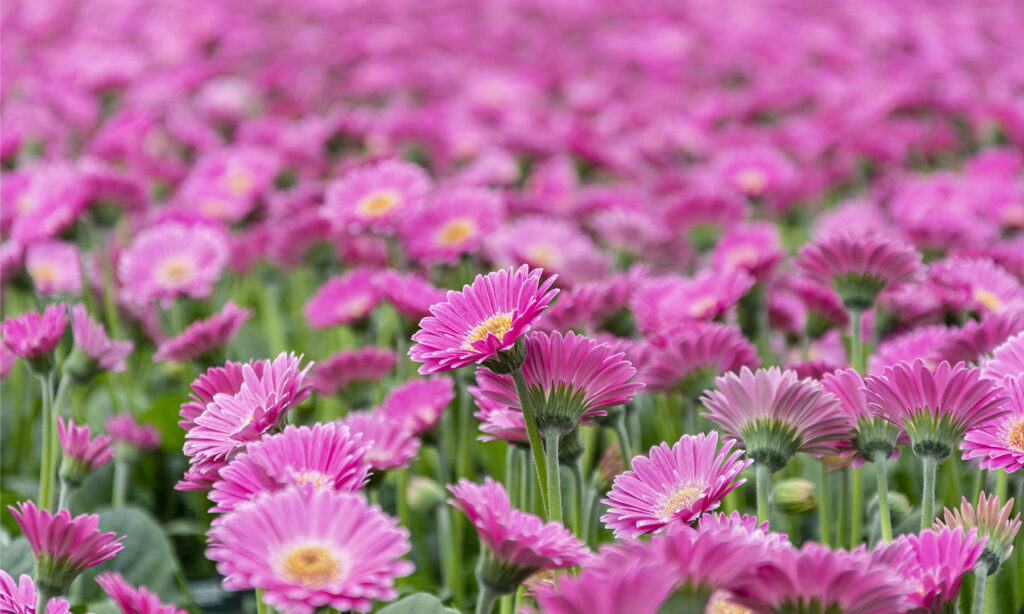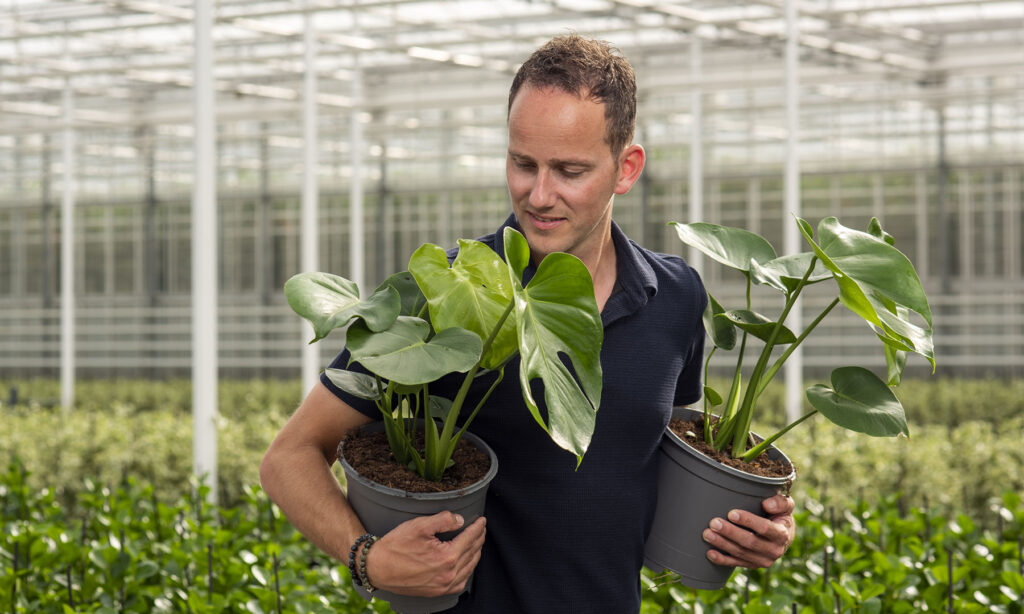‘Who does green, meets green’. Plantanious’ vision is short and sweet. By investing heavily in geothermal energy and solar panels, this nursery of green houseplants and seasonal flowers produces completely climate-neutral products. A story they continue today together with nursery Persoon Potplanten. Each with its own identity and structure, but joining forces. Because one n plus one is always more than two. An interview with co-owner Joost Jansen.
Twinning = winning
What happens in the family, stays in the family. More than eighty years ago, grandfather Piet Jansen laid the foundation of what is Plantanious today. Back then with a focus on growing vegetables. Twenty-four years ago followed a first tipping point.
“If you grow vegetables then it has to be fast and besides, you are not in contact with customers,” Joost explains. “Our father Loek Jansen missed that aspect. He no longer felt it fit our values. Hence the switch to potted plants.”
Twelve years ago, sons Joost and Freek joined the business. Twin brothers with dark green hearts. In everything they undertake, they consider the impact on the environment. Their mission? To make the company grow and prosper and strive for a green, healthy world. Growing in breadth because today the merger with nursery Persoon Potplanten is a fact. Scaling up while maintaining a family character.
“As entrepreneurs, Freek and I are always looking for ways to take steps forward. We wanted to unburden our clients with an even wider range of products. Just then, our uncles Aad and John Persoon were looking for an acquisition candidate. A golden opportunity. The two nurseries retain their individuality but join forces.”
Protected species
Plantanious produces on 4.5 hectares, with the acquisition the total area is around 9.2 hectares. The product range complements each other nicely. “We specialise in small-leaved green houseplants such as the Ficus, while Persoon Potplants has rather large-leaved houseplants in its range, such as the Monstera, Alociasia, Philodendron and Strelitzia. Especially the Monstera Pertusum is an eye-catcher. Because we, along with another Belgian grower, are the only growers with a stock of mother plants, this makes us unique. From Plantanious, we are particularly proud of our protected ficus species. They stand out from other varieties because they are so strong and voluminous.

Our seasonal products also stand out. We are known for our tub plants on stem. And also for our Gerbera, Limonium and Alstroemeria. Actually cut flowers but because they do so well in the market, we sell them as potted plants.”
Self-sufficient in heat, power and water
The merger with Persoon Potplanten is a recent milestone, but a real pivotal moment came four years ago. That’s when the Jansen brothers invested thoroughly in geothermal energy and solar panels. “Green innovations run like a thread throughout our operation.
Geothermal energy was an important step towards gas-free production. We joined the geothermal heat project ‘Nature’s Heat’, tapping into the heat source located at a depth of 2.5 km. This means we heat our greenhouse with no CO2 emissions, something that is still unique in horticulture. Ditto for the number of solar panels. Today, the counter stands at 1,300 panels.
We always look to the future with an open and, above all, green sights. And then you automatically bump into developments that represent a big leap forward ecologically
Joost Jansen
Besides electricity and heat, water is also a major challenge for our sector. That is why we use a closed water system. All the water we use we collect for reuse. And we want to take this even further. For instance, together with other companies in the area, we are investigating how we can store excess water in the ground in winter to be used in summer.
Persoon Potplanten also follows our green philosophy. For instance, they do not heat with geothermal energy but use the residual heat of a rose grower in the neighbourhood. This grower uses the electricity from his CHP to light his roses. The resulting heat is not lost but pumped to us through an underground pipe. Equally sustainable. Persoon Potplanten also has enough solar panels to be energy-neutral.”
Every little helps
These are the biggest investments, but Plantanious is scrutinising all steps in the cultivation process. One of the goals is to replace the not-so eco-friendly bamboo cane in the short term. “Those bamboo canes are produced in China. So to transport them here you are left with a high ecological footprint. So we found the best solution close to home: a support stick made of Miscanthus Giganteus – also known as elephant grass – and potato skins. In collaboration with Ruplex BV, we created the alternative to the bamboo stick. With its rough look and moisture-resistant property, the stick is both durable, functional and visually appealing. A relatively small intervention in the production process but with a substantial sustainable impact. And so we invest a lot of time to green and improve all the steps.”
Certification pays off
There is no end to Plantanious’ list of efforts to reduce its impact on the environment. Plastic they reduce to a minimum and further, they opt for integrated organic growing. Not surprisingly, they are certified with MPS-Gap and -SQ. “That speaks for itself. Okay, it requires some efforts. You have to adjust your working methods and also your personnel policy, but once that is behind you, you only reap the benefits.”

Subscription at Floréac
For Plantanious, sustainability is also in long-term partnerships. Like the one with Floréac. “Marlon van Breugel of Floréac always smilingly refers to us with: ‘No incidents but subscriptions’. And that’s right, it clicks and we know what we can gain from each other. A recent example: when we suddenly had to order via Floriday, it was quite radical. As a result, we had to reconnect our own system. Floréac expertly guided us through this. And vice versa, they can count on us. After all, we want to supply the day trade and then continuity is essential.”
Green makes a difference
Finally, a word about the future. “Our vision is not for nothing: ‘He who does green, meets green’. We always look to the future with an open and, above all, green outlook. And then you automatically bump into developments that represent a big leap forward ecologically. We remain committed to a more sustainable and profitable cultivation process. This is how we want to distinguish ourselves in the market. Always one step ahead of the rest and each time with a smaller ecological footprint.”
